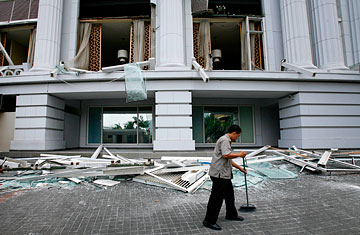
A worker sweeps at the site of a bomb blast at a Ritz-Carlton hotel in Jakarta, Indonesia, on July 18, 2009
The Muzak at the glitzy Grand Indonesia mall competed with the chatter from shoppers taking advantage of a national holiday to stroll through one of Southeast Asia's largest malls. Last Friday, July 17, a pair of bombs ripped through two luxury hotels in the Indonesian capital, Jakarta, killing seven innocent people (plus the two suicide bombers). Yet by July 20 local residents appeared to be returning to life as normal. Indonesia had enjoyed a four-year lull in terrorist attacks, in part chalked up to a concerted government campaign to arrest and re-educate extremists. Although the blasts jolted a nation into realizing that terrorism was no longer a thing of the past, the prevailing attitude among Jakartans seemed to be one of determined resilience. "Bad things can happen anywhere — car accidents, illness," says Syarif, an accountant who was window-shopping with his wife and two small children. "The bombing was bad, but we have to continue our lives."
Now the question is whether the foreign community will be as forgiving. Over the past year, Indonesia has profited from the political uncertainty in regional neighbors Thailand and Malaysia, with foreign investors considering the once turbulent country as an alternative location to park their cash. Indonesia recorded 4.1% year-on-year growth in the first quarter of this year, a particularly impressive feat given the global economic crisis. A peaceful presidential election on July 8 underscored the feeling that Indonesia, just 11 years after emerging from dictatorial rule, was transforming into a democracy serious about tackling corruption and wooing foreign investors with its stable political climate.
But the July 17 bombings, as well as the assassination of an Australian mining employee working in the remote province of West Papua earlier in the month, reminded the world that foreigners continue to be the intended victims of terrorism in Indonesia. Not only did the bombs detonate at the JW Marriott and Ritz-Carlton hotels, which are popular with foreign guests, but also the suicide attacker at the Marriott appears to have deliberately targeted a group of mostly Western businessmen and diplomats with his explosives. While his counterpart at the Ritz-Carlton focused on the busy restaurant where people were breakfasting, the Marriott terrorist walked toward a side room where a group of Jakarta-based expatriates was conducting a regular business meeting.
The event was hosted by CastleAsia, an economic and political-risk consultancy headed by an American businessman who has lived in Indonesia for many years. Three Australians and a New Zealander who were attending the breakfast were killed, as was an Indonesian hotel employee. Several other foreigners from the same meeting remain in the hospital with serious injuries. On Sunday, July 19, Australian Foreign Minister Stephen Smith visited the Jakarta bombing site to show his government's sympathy for the victims.
Jemaah Islamiah (JI), a homegrown terrorist network, has advocated targeting Westerners in the past, as it did to deadly effect during the 2002 and '05 bombings on the resort island of Bali and a previous assault on the same Jakarta Marriott six years ago. In the latest hotel attack, Indonesian police are now fingering a possible splinter group of JI run by a Malaysian operative named Noordin Top, who has evaded capture for several years.
As investigators follow the terrorist trail, there are, at least, encouraging precedents for the country's economic prospects: the 2003 Marriott bombing didn't result in a major investment outflow, and Bali eventually recovered economically from its attacks, which killed more than 220 people on the island. Indonesians can only hope that the latest effort to dissuade foreigners from doing business in Southeast Asia's biggest economy will also fail.
